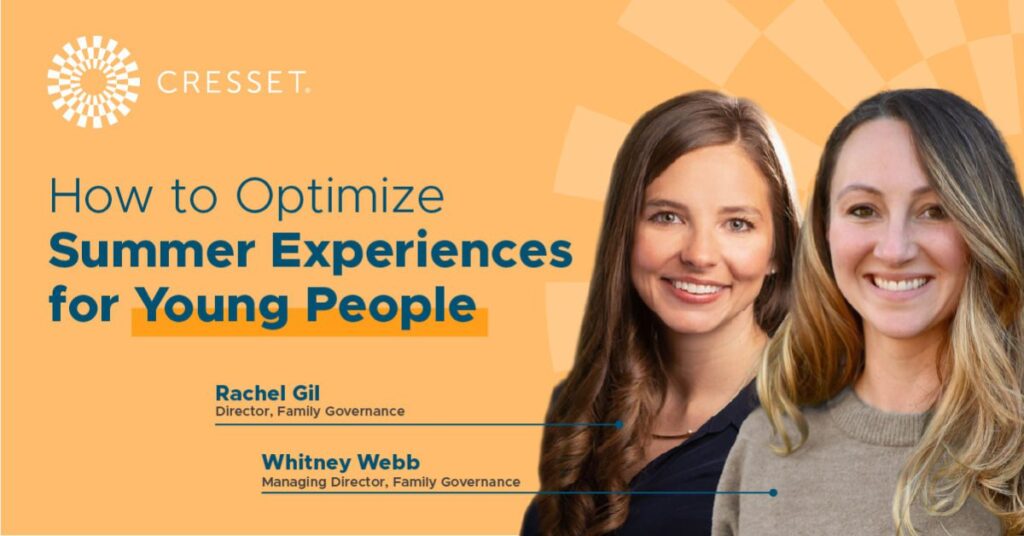
Many teens, college students, and their parents find themselves anxious to make the most of their summer experiences as the season approaches, wondering how to balance all the competing priorities. Enriching summer experiences are highly desirable on college applications and can make for excellent talking points while interviewing for that first job or internship. However, summer is also a time for young people to experience autonomy and independence, letting their personal curiosities lead them to action. Add in the expectations of family members and the very real need to relax, and eight weeks is nowhere near enough time to do it all.
There is no specific formula for how to best spend one’s precious time, but the goal should be to get clear on intentions, design a diverse mix of experiences to meet various goals, and be open-minded to the outcomes and lessons that can be learned.
Many young people spend their summers working at entry-level jobs where they can learn lessons in work ethic, power dynamics, and social responsibility, which can eventually shape their future careers. Some spend summers traveling abroad, which can open one’s eyes to complex world issues and provide confidence in future decision-making and career choices. Some experiences lead directly into a career path, as we have seen in our advisory work with teens, young adults, and families. One young woman attended a summer entrepreneurship program and created a pitch for a farming co-op app in a developing country. Having a curiosity around international development but no background in farming, she ended up loving it so much that she wrote her college essay on her experience and was accepted to one of the top universities for agricultural business. Another young man spent his summer watching how-to videos and building robots, eventually making a fully functioning one that he still has today as he completes his master’s degree in engineering.
While these sorts of experiences can be impressive to a college admissions officer and recruiters, the most important takeaways from any summer experience are to learn more about yourself, identify moments that spark passion, and recognize that each experience helps design your future. So, where to start? Here are some ideas of meaningful summer activities for young people:
Summer jobs. Some of the best lessons in life are learned scooping ice cream, hosting at a restaurant, mowing lawns, or working at summer camps. These are viewed favorably with college admissions staff and hiring managers alike, as proof of dedication and work ethic. Also, you will be asked throughout your life no less than 500 times what your first job was, so don’t forget any funny stories to help add some color to your stories.
Camps and experiential programs. From wilderness survival to coding camp, there are summer learning experiences available for virtually every interest. Some are day camps, and others are multi-day overnight experiences, which can be particularly impactful. One example is Launch Generation by Cresset, a hybrid of a conference and a summer camp which exposes teens ages 14-18 to the concepts of entrepreneurship, personal finance, and leadership through experiential education. Participants leave with tangible products like a fully formed business pitch deck, but also with increased exposure to career paths, confidence in decision making, and a global network of friends and future business partners. For more inspiration on various topics, from camps to conferences, and tangible and intangible takeaways, check out Teen Life and Activity Hero.
Travel. Traveling as a family, with friends or siblings, or even solo, can be hugely impactful for young people. Very few experiences broaden one’s horizons like seeing the world. When young people push themselves out of their comfort zones, wonderful life lessons can be learned. Some lessons will become immediately apparent (quickly enough to include in a college essay); others will present themselves throughout their lives. Where There Be Dragons and Rustic Pathways are structured travel programs with great track records to consider.
Service learning. For young people, volunteering should be framed as service learning. Many young people will not often have specific expertise to share. Rather, their value is realized through assisting in small tasks and educating themselves on issues and the organizations they are supporting. Service learning often helps put personal challenges in perspective, but more importantly, opens new opportunities and motivation to address issues that have a broader societal or global impact. Idealist.org has a database of volunteer opportunities and internships abroad.
Enrichment can come in many forms for young adults. They can plant a garden, make a music video, start a business, or train to run a marathon. Whatever it is, young people should be encouraged to stay curious, open-minded, and excited about their summer experiences and life’s broader opportunities.
Whitney Webb is the Managing Director of Governance, Education, and Philanthropy at Cresset and the founder of Launch Generation, experiential programs for teens focused on financial literacy, leadership, and entrepreneurship. She has been working to help educate families for almost a decade on topics such as personal finance, business, philanthropy, and personal and professional development.
About Cresset
Cresset is an independent, award-winning multi-family office and private investment firm with more than $235 billion in assets under management and advisement (as of 10/31/2025). Cresset serves the unique needs of entrepreneurs, CEO founders, wealth creators, executives, and partners, as well as high-net-worth and multi-generational families. Our goal is to deliver a new paradigm for wealth management, giving you time to pursue what matters to you most.
https://cressetcapital.com/disclosures/
